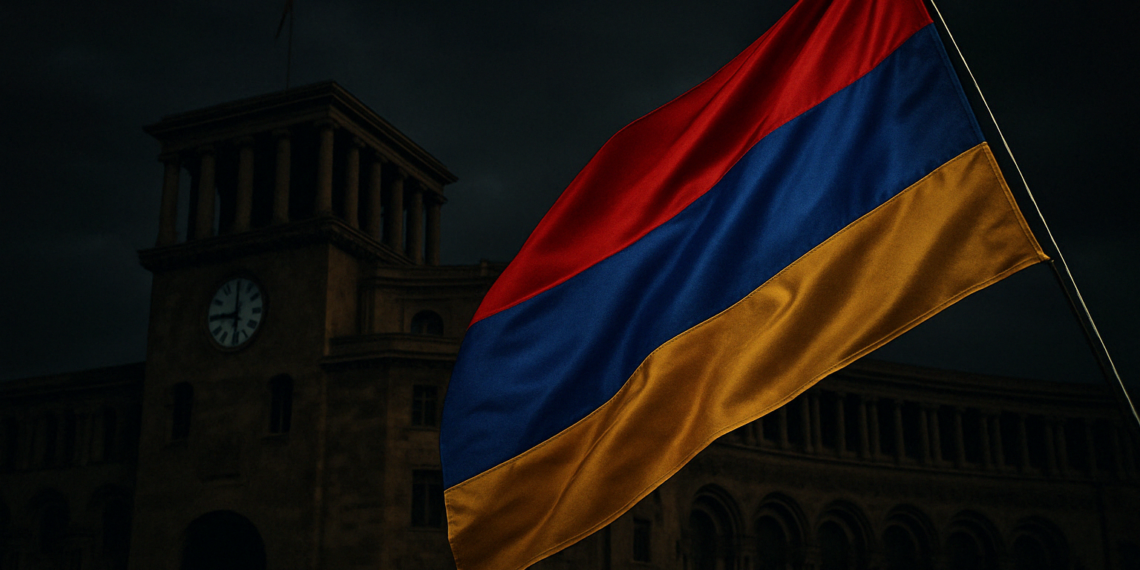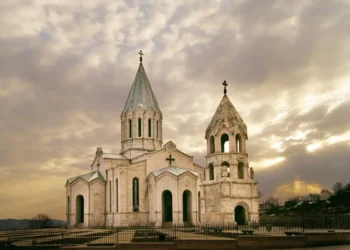YEREVAN (Realist English). The Republic of Armenia stands at the brink of political extinction. This is not a figure of speech. The process has already begun: orchestrated externally, executed internally, and promoted under the deceptive label of “peace.” If not stopped, the so-called peace agreement between Armenia and Azerbaijan may become not a roadmap to peace, but the final act of surrender — and the prologue to the nation’s disappearance.
Below is a summary of what Armenia’s current leadership appears ready to concede — without resistance and without shame.
A treaty without guarantees, without benefit, without dignity
The draft agreement, developed under foreign pressure and on terms dictated by Baku, contains no enforceable security guarantees for Armenia. It can be broken by Azerbaijan at any time — a regime that has already shown genocidal intentions. Despite this, Prime Minister Nikol Pashinyan has made no counter-demands in return for his declared willingness to sign.
Instead, Armenia would undertake the following irreversible commitments:
- Silencing genocide: Armenia agrees to refrain from referencing the genocide and ethnic cleansing committed in Artsakh and Azerbaijan. It would also dissolve the OSCE Minsk Group — the only international body ever engaged in Karabakh conflict resolution. In effect, these crimes would be legitimized as acceptable outcomes. The Armenian government would thus be accepting the mass extermination and forced expulsion of Armenians as both normalized and legitimate — setting a precedent for similar actions within Armenia itself. As pro-Turkish Foreign Minister Ararat Mirzoyan recently stated in parliament: «Since no one lives there anymore — there are no Armenians — there are no rights left to defend. This agenda is over.»
If accepted, what happened in Artsakh could soon happen in Syunik or Tavush. - Ignoring cultural destruction: The Armenian government would forgo any official response to the systematic eradication of Armenian cultural heritage in Artsakh — a textbook case of cultural genocide.
- Erasing national tragedy: The agreement implies silence on the Armenian Genocide and the forced exile of millions (1893–2023), all to appease Turkey — Azerbaijan’s ally and a co-author of these crimes. Armenia would effectively renounce its right to historical truth.
- Strategic concessions: Azerbaijan and Turkey would be granted a land corridor through Meghri and possibly other regions — without reciprocal guarantees. Alarmingly, the planned railway through Meghri would not be overseen by Armenian border or customs authorities, a direct threat to sovereignty.
- Normalization of territorial loss: Azerbaijan’s occupation of approximately 240 km² of Armenia’s internationally recognized territory is being quietly accepted. It is neither mentioned in the draft nor tied to the treaty’s finalization — and is increasingly omitted from official rhetoric.
- Undermining statehood: Armenia’s Declaration of Independence — the legal cornerstone of its statehood — would be removed from its constitutional framework and reduced to a symbolic, non-binding document.
- Withdrawal from legal defense: Armenia would commit to dropping all international legal claims against Azerbaijan over war crimes and crimes against humanity committed against Armenians.
- Historical falsification: The Armenian educational system would be revised to distort national history and erode collective memory and identity.
- Criminalizing patriotism: Citizens and civil society organizations who oppose Turkey’s and Azerbaijan’s anti-Armenian policies — or defend Armenian dignity — would face legal restrictions and potential persecution.
A silent liquidation under the banner of “peace”
These measures point to one goal: the quiet elimination of the Armenian state, without international uproar, under the cover of false “normalization.” What is sold as diplomacy is, in reality, capitulation. What is labeled “peace” is, in truth, a surrender of national existence.
At the previous stage, Armenia lost Artsakh — nearly one-quarter of its de facto territory from 1991 to 2020. Now, the groundwork is being laid for the dismantling of what remains — through the erosion of Armenia’s military, economic, demographic, cultural, and moral foundations. A new wave of deportation is not a distant possibility — it is a matter of time.
This government has abandoned the principle of resistance as a foundation of state policy. If the great powers have long since disregarded Armenian blood, Pashinyan seems intent on proving that, to him, it means even less.
This “peace agreement” is a new Treaty of Kars — only worse. The 1921 deal with Kemalist Turkey, signed under Bolshevik pressure, at least came with Soviet security guarantees. Today, Armenia gets nothing. The peace this agreement promises will be short-lived, deceptive, and pave the way for the country’s physical and political erasure.
Capitulation must be rejected — resistance must begin now
The path chosen by the government must be abandoned. Resistance is not just necessary — it must begin immediately. Unfortunately, the opposition has failed in its responsibility. Whether due to incompetence or design, it has left the people leaderless and unguided. The state apparatus has walled itself off from society. And the nation stands without a head.
Tomorrow may already be too late.
Armen Ayvazyan – military analyst


















